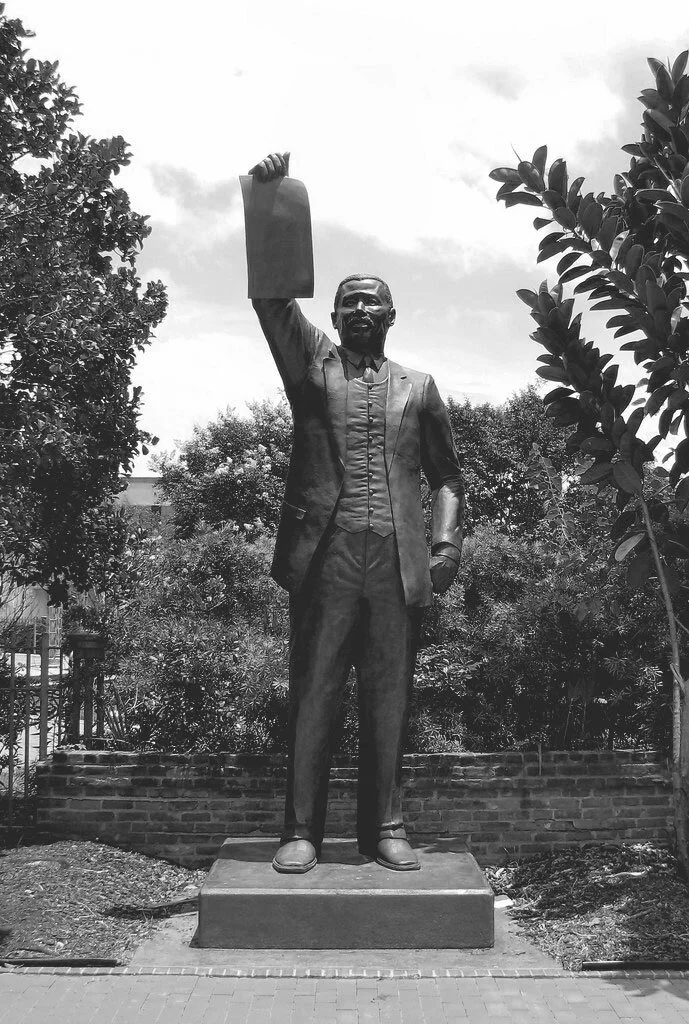Juneteenth & the Power of Public Holidays
The statue in Galveston, TX, commemorating the arrival of the news that people being held in slavery had been legally freed, the occasion which would become known as Juneteenth.
By Geoff Davies
Today in the United States, President Biden signed a bill to make Juneteenth National Independence Day a federal holiday, the 12th legal public holiday in the USA and the first one enacted in decades, since Martin Luther King Jr. Day was enacted in 1983.
Each week we dedicate this space (in the Future of Masculinity newsletter) to the idea of ‘Outward’, and to things in the world that we can do, see, touch and feel to help bring ourselves that much closer to the Future of Masculinity that we stand for.
Today this space is dedicated to Juneteenth.
It’s not everyday a country gets a new statutory holiday. The last one enacted in the United States was made to create a space of observance for a similar sort of idea: one of freedom, and equality, and a dream.
Maybe there is something telling in what we as societies choose to honour in our holidays.
Recently in Canada, the conversation around what statutory holidays we should (or should not) celebrate has become extremely poignant, after the discovery at the Kamloops Indian Residential School site.
Is it still meaningful to celebrate Canada Day on July 1 in the same breath as we bring awareness to the systems of harm it also represents?
Or, conversely, there is the question whether a national holiday—like the one Canadians will now celebrate each Sept. 30, after it became official earlier this month—is a sign of progress, or simply symbolism, when it comes to honouring Truth and Reconciliation?
(There are more layers of injustice to peel back, too, when we look at the decisions around exactly which causes do, and don’t, get a national holiday. And then let’s spare a thought and care for marginalized folks, and remember that not everyone gets time away from work to mark these days.)
As Jake has said to many a workshop: allyship should cost you something—time, money, energy, social capital. Time, especially, is at the heart of the transaction we make to make these days sacred: when time equals money, a day off leaves people feeling richer.
It’s economically significant too: According to data from the Canadian Federation of Independent Business, an extra day off for workers in this country equates to costs for businesses in $3.6 billion in lost productivity—a figure that can only be exponentially bigger in the United States.
More and more, time literally equals money, and for that reason—because it costs something, and because it is worth something beyond intangible dollars and cents—creating a national holiday is a powerful way for our societies to put their money where our values are.
But the root of equality is this simple fact: that we all have time, and we all only have so much of it. Whatever price the market may put on one person’s time versus another person’s, a minute to me is the same as a minute to you. And each minute is sacred, because one day we run out.
Whether it’s spreading this respect for Juneteenth further and wider, or taking a day in Canada to show that we mean it when we say that Truth and Reconciliation is meaningful to us, let’s remember that we can also make a difference by voting with our ‘dollars’—let’s spend our time wisely, and show the value of equality, empathy, and freedom.
From the Future of Masculinity weekly newsletter, where our community’s hearts and minds come together each week to do the work, tell the stories, and build the blueprint for a future where men and boys experience less pain and cause less harm. Written by Next Gen Men Copywriter and Content Strategist Geoff Davies.

